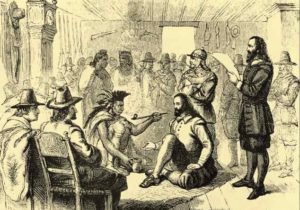
WASHINGTON – Four hundred years ago, the Mashpee Wampanoag tribe in Massachusetts allied with English settlers in Plymouth and helped them through their first year in America.
Friday, the U.S. Interior Department (DOI) informed the Mashpee it will disestablish the tribe and remove its 129-hectare Cape Cod reservation from federal trust.
Tribal chairman Cedric Cromwell called the move “cruel” and “unnecessary” in a statement on the tribe’s website, especially coming at a time when the tribe struggles to protect roughly 3,000 members from the COVID-19 pandemic.
“The Secretary (David L. Bernhardt) is under no court order to take our land out of trust. He is fully aware that litigation to uphold our status as a tribe eligible for the benefits of the Indian Reorganization Act is ongoing,” Cromwell said. “It begs the question, what is driving our federal trustee’s crusade against our reservation?”
Lengthy legal battle
The DOI’s Bureau of Indian Affairs recognized the Mashpee in 2007, declaring the tribe had met strict requirements — it had operated as a community since pre-colonial times, and 97% of its members were directly descended from the historical tribe.
In 2015, the Obama administration designated about 130 hectares of land in trust as the Mashpee’s reservation — 60 hectares in the town of Mashpee on Cape Cod and 70 hectares of land about 56 kilometers away in the town of Taunton.
The Indian Gaming Regulatory Act allows tribes to operate gambling casinos on trust land, and the Mashpee began making plans to build a $1 billion destination casino on the Taunton land parcel.
[content id=”79272″]
But in 2018, the Interior Department reversed the earlier decision on the grounds that the Mashpee tribe wasn’t under federal jurisdiction when Congress passed the Indian Reorganization Act in 1934.
That’s when House Democrat William Keating stepped in. In early 2019, he introduced the Mashpee Wampanoag Tribe Reservation Reaffirmation Act (H.R. 312) in a bid to get Congress to recognize and protect the Mashpee homelands.
In May 2019, just before the bill came up for vote in the U.S. House of Representatives, U.S. President Donald Trump tweeted his opposition to what he called “a special interest casino bill.”
Republicans shouldn’t vote for H.R. 312, a special interest casino Bill, backed by Elizabeth (Pocahontas) Warren. It is unfair and doesn’t treat Native Americans equally!
— Donald J. Trump (@realDonaldTrump) May 8, 2019
Keating shot back at Trump with a tweet of his own, in essence accusing the president of acting in his own interests.
Trump signed an identical bill last year. So why tweet against a bill recognizing the tribe of the first Thanksgiving? Because of his well-documented alliance with the RI casino lobbyist. A weak attempt to hide corrupt influence in a racist tweet.
— Congressman Bill Keating (@USRepKeating) May 8, 2019
That bill subsequently stalled in the Republican-majority Senate.
The Washington Post reported in May 2019 that the Mashpee casino threatened business at two Rhode Island casinos with strong ties to Trump.
Separately, the Mashpee Wampanoag filed suit against the Interior Department to challenge its reversal. That lawsuit is still pending.
VOA was unable to reach the tribal council chairman for comment, but in a 2017 interview, Cromwell said the Trump administration was not “supportive” of tribal trust lands.
“It’s a new administration under Trump,” Cromwell said. “They are trying to change the regulatory process, the trust policies that Obama put in place.”
Jonodev O. Chaudhuri (Muscogee Creek Nation), a partner at the Washington, D.C.-based law firm Quarles & Brady, formerly served as chairman of the National Indian Gaming Commission under former President Barack Obama.
Chaudhuri called the DOI decision “alarming.”
“There certainly may be considerations about how the commercial gaming industry might be impacted by this that very well could have been a factor in the decision-making, but I’m not about to speculate with regards to that,” he said.
Chaudhuri stressed the Indian Reorganization Act was a tool intended to support tribal self-determination.
“And part of that is helping tribal nations restore homelands,” he said. “So, if that’s the overall policy, thought should be given to as much flexibility as possible for tribal nations to restore their authority over their land and provide essential governmental services to their citizens.”
Massachusetts senators Elizabeth Warren and Edward J. Markey issued a joint statement Sunday vowing to fight what they called “a cruel injustice.”
“Disestablishment of the Mashpee Wampanoag reservation would reopen a shameful and painful chapter of American history of systematically ripping apart tribal lands and breaking the federal government’s word,” they said.
Presidential hopeful Sen. Bernie Sanders of Vermont posted on Facebook that he stands with the tribe and opposes the “disgraceful decision by the Trump Administration.”
“For far too long, the federal government has adopted policies that take land away from tribes, ignore treaty rights and interfere with tribal management of their own resources,” he posted.
Source: VOA







